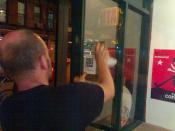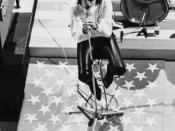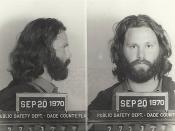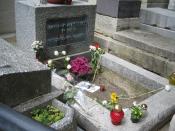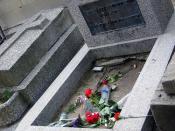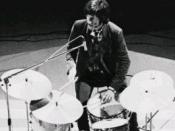By: Jason Thompson For my I-search paper I decided to write about Jim Morrison, the former lead signer of the legendary rock band The Doors. Every time I would flip through catalogs I got through the mail selling music related items I always noticed a large selection of t-shirts and CD's bearing The Doors logo or Jim Morrison's famous picture, the one where he isn't wearing a shirt, looking straight at me, with the words underneath saying Jim Morrison 1943-1971. I have always been a fan of The Doors but I also have always wondered what makes him so special? Why is Jim Morrison's spirit, his message still thriving after all these years? Why did so many people view as him as a god? Why do some people still? I began the research process without having any inkling as to what I was looking for. I mean how do I find the answers to the questions that I have? None of my questions can be answered easily, none of them can even be answered with words, it's all prospective and understanding.
I had to understand the location, the time, The Doors, and Jim Morrison himself, and see things from the eyes of the people living in this time and I had to see through the eyes of Morrison.
The entire research process started with me checking out a book from the library titled Wilderness: The Lost Writings of Jim Morrison, a bound collection of poems by Morrison. At the time I checked out this book I hadn't intended to use it for this paper, it was originally for recreational reading. I read the book, Morrison's poems were very complex, he used many metaphors; all of this made his writings very hard to comprehend some of them were completely inexplicable. But it was this book of poetry and perhaps the lack of understanding that enticed me to continue my research of Morrison and the band; hopefully I would gain some insight into what these poems meant.
After I dedicated myself to this research topic I went and rented Oliver Stone's 1991 major motion picture release, The Doors. The Doors was the final spark that ignited my drive to do this paper. This film was a very accurate account of the details surrounding the band and the life they led during this significant and crucial period in American history. The Doors came about during a time when American's were confused, they were confused about their thoughts and feelings about what was happening in the world around them, the band began to hit it big in during the middle of the infamous Vietnam War.
1965 in Los Angeles was the beginning of the "hip scene"ÃÂ, Jim Morrison was attending UCLA's film school. After receiving some negative criticism in on of his classes about a project that he worked hard on, Morrison decided that Film School was not for him. Morrison started spending a lot time at the Santa Monica beach, this is where he and met up with Ray Manzarek, the future pianist for The Doors. Manzarek had known Jim from film school; they talked and became friends. Morrison began reading Manzarek some of his poetry, Manzarek coaxed him into signing some pieces, and it all began there. The other two members of the band were met by Manzarek at meditation center in Southern California; John Densmore, the drummer and Robby Krieger the bands' guitarist, they were quickly added to the bill. By early 1966 the band began playing live at small clubs on Sunset Strip, they developed a small but emerging following. [Lydon, 1969] The Doors got signed to Elektra Records and released their first album, which was self-titled in January 1967. From this album they released two singles "Break on Through"ÃÂ and "Light My Fire"ÃÂ, the subsequent generating the big buzz for the band placed The Doors at the top of US charts. [Elektra, 1967] Immediately a strong following began to grow for the band, many teenagers saw The Doors as their release, a way to escape the world, which they were subject to. The Doors continued with six more major-label LP releases in the next four years, each album diminishing the power The Doors originally held little by little.
During the time they were thriving The Doors drew a large, active audience. Many concerts, such as the one in San Francisco in November of 1967, the band was inundated with young girls coming on to the stage naked; they had to be pried off. Concerts such as this one preceded and followed, until 1969. [Windeler, 1967] The notorious Miami concert, in 1969 is said to be the end of the era for The Doors. Many newspapers called the Miami concert a disaster. Morrison showed up almost an hour late for the concert in The Dinner Key Auditorium, the band's manager has been arguing with the promoters of a breech of contract, the auditorium was filled with double the amount of people the band was getting paid for. The band had already taken the stage without Morrison and began playing the intro to "Break on Through"ÃÂ. Morrison finally took this stage, only this time his usual drunken state had increased above his norm. Morrison tried to sing a couple versus but he started a sermon about how he wanted to change the world, the band tried to ignore this and get him to return to the music by playing other songs, none of it worked. Morrison was drenched with champagne by an audience member and took off his shirt, he began saying, "Let's see a little skin, let's get naked"æman, I'd like to see a little nakedness around here"æYou want to see my cock, don't you?"àWhat happened next is debatable, either his mimicked or he actually did show the audience his penis. Morrison then was thrown into the audience where he led a snake dance around the auditorium, then him and the rest of the band went backstage, the audience after a small riot went home. Later the State of Florida found him guilty of Indecent and Immoral Acts and he was sentenced to eight months in jail, which he never served. [Morris] After the "Miami Incident"àfor six months it was hard for The Doors to find a concert, this event "destroyed"àtheir image with the American public. The Doors released 3 LP's and a live album, none of them ever gaining the recognition that their first two did. In April 1971 L.A. Woman was released, Jim was taking a leave of absence from the band and was in Paris with his common-law wife Pamela Courson. L.A. Woman was doing well in the United States, Jim was pleased about this, when Densmore the bands drummer called to tell him about the success, just three weeks before Morrison's death, Jim talked of getting back together soon to lay down some more tracks. What Densmore neglected to tell him was that the band was already in the studio working; they were considering moving on without him. [Densmore, 1991] July 3rd Morrison, Courson, and an undisclosed friend went out partying. Early in the morning Morrison had gotten out of bed and told Courson that he wasn't feeling well and that he was going to take a bath; she went back to sleep. Around 5 am July 4th, 1971 Courson awoke again, noticing that Jim was not in the bed she went into the bathroom to check on him. In the bathtub of their flat she found Jim Morrison's cold, lifeless body with a smirk on his face. At first Courson thought Jim was playing a cruel joke on her but she soon realized that he was not and called a friend and the ambulance. [Densmore, 1991] Officially the cause of death was listed as "natural causes"ÃÂ; there was never an autopsy. Funeral services were held in Paris July 8th and Morrison was laid to rest in PÃÂère Lachaise cemetery in company with Edith Piaf and Oscar Wilde. [AP, 1971] James Douglas Morrison was born in Melbourne, Florida December 8, 1943 to Steve and Clara Morrison. His father was a naval office who moved his family around a lot. [Peters] The biggest influence in his whole life Jim claims occurred during one of these moves. Jim said, "The first time I discovered death...me and my mother and father, and my grandmother and grandfather, were driving through the desert at dawn. A truckload of Indians had either hit another car or something- there were Indians scattered all over the highway, bleeding to death. I was just a kid, so I had to stay in the car while my father and grandfather went to check it out. I didn't see nothing- all I saw was funny red paint and people lying around, but I knew something was happening, because I could dig the vibrations of the people around me, and all of a sudden I realized that they didn't know what was happening any more than I did. That was the first time I tasted fear...and I do think, at that moment, the souls of those dead Indians- maybe one or two of them- were just running around, freaking out, and just landed in my soul, and I was like a sponge, ready to sit there and absorb it."à[The Doors and Jim Morrison] Whether this event actually took place and whether it actually had any effect on Jim's life is unknown by anyone except Jim, himself, but maybe it was what made him so special.
All of Jim's life he was eccentric; in school he loved showing off and always had to be the center of attention. In his personal life he was addicted to drugs and alcohol and loved the whole "rock star"ÃÂ lifestyle. On stage Morrison loved to taunt his audience. [Rolling Stone, 1981] The power he held and still holds over hundreds of thousands of people still remains unattainable to comprehend, no one knows why the soldiers fighting in Vietnam were fascinated by the band's song "The End"ÃÂ, or why so many people want to buy a shirt with his face on it. No one knows why Jim Morrison was and still is by some, considered a god. I could not find these answers through any of the research that I have done, perhaps it's because no one knows, or perhaps it's because Morrison achieved what he viewed himself as, "I see myself as a huge fiery comet, a shooting star. Everyone stops, points up and gasps, "Oh look at that!" Then- whoosh, and I'm gone...and they'll never see anything like it ever again... and they won't be able to forget me- ever."ÃÂ [Jim Morrison and The Doors] By: Jason Thompson Works Cited: 1. Lydon, Michael "The Doors: Can They Still "ÃÂLight My Fire'?"ÃÂ The New York Times 19 Jan. 1969 2. Elektra Records Biography: "Jim Morrison Biography"ÃÂ 1967 http://www.jmorrison.cjb.net 3. Windeler, Robert "Doors, a Way in and a Way Out, Rock on Coast"ÃÂ The New York Times 20 Nov. 1967 4. Morris, Jan E. "The Miami Incident"ÃÂ The Doors Collector Magazine 11 Sept. 2001 http://www.jmorrison.cjb.net 5. Densmore, John. Riders on the Storm: My Life With Jim Morrison and The Doors. New York: Dell Publishing, 1991.
6. Associate Press "Jim Morrison, 25, Lead Singer With Doors Rock Group, Dies"ÃÂ The New York Times 9 Jul. 1971 7. Peters, Tracie. The Life of Jim Morrison 11 Sept. 2001 http://empirezone.com/spotlight/morrison/morrison1.htm 8. Gillmore, M. and Brodsky, J. "The Legacy of Jim Morrison"ÃÂ Rolling Stone 4 Apr. 1991: p30 9. "Jim Morrison and The Doors"ÃÂ 11 Sept. 2001 http://www.jmorrison.cjb.net 10. Fowlie, Wallace. Rimbaud and Jim Morrison: The Rebel as Poet Durham: Duke University Press, 1994
